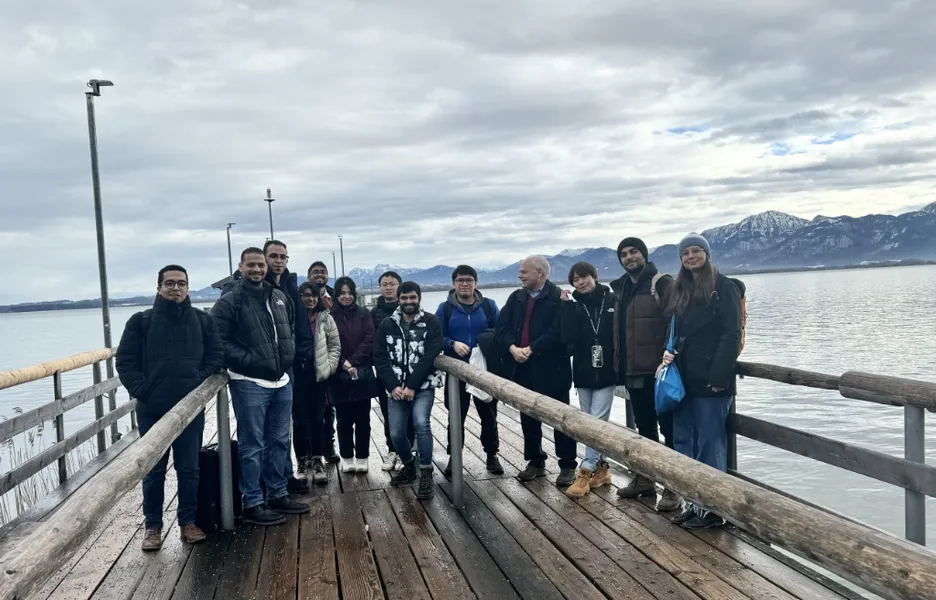Cloud Computing (IN2107)
Prof. Dr. Michael Gerndt, M.Sc Isaac Nunez, Jianfeng Gu, Srishti Dasgupta, Shajulin Benedict
| Dates: | Started already. Presentation at Frauenchiemsee 04.-05.12.2024 |
| Planning meeting: | Tuesday, July 2nd,18:30 https://tum-conf.zoom.us/j/2176944321?pwd=bDhURGJDVFdHMDhtdC9vMk1HWEZYdz09 Meeting ID: 217-694-4321 Password: 738086 |
| First meeting: | |
| ECTS: | 5 |
| Language: | English |
| Type: | Seminar, 2S |
| Moodle course: | |
| Registration: | Matching System |
Organization
- We have a total of 12 available places for our cloud computing seminar.
- Each student will select a seminar topic and submit a paper on that topic.
- We will use hotcrp as the tool for submission of seminar papers.
- To make students more familiar with the scientific peer-reviewing enviornment, each submitted paper will be assigned two fellow students that will review the paper and give feedback.
- Each student will also prepare a 30 minute presentation on their topic.
- All seminar presentations will be held in-person at Frauenchiemsee. Transportation and stay will be covered by the Chair. Food will not be covered which will cost around 60 euros. Students must have a deutschland ticket.
- Presentation tentative dates: Jan 2024 End.

Motivation
Cloud computing is dominating the IT sector due to its on-demand provisioning of resources. It enables highly elastic and scalable application work loads with huge differences in computational and storage demand. The Internet of Things is an excellent use case for clouds as it has a varying amount of incoming sensor data creating huge storage requirements. Accesses to the data might be based on short running functions but also compute intensive analytics jobs are run on the data. Other applications follow the cloud native model where the application is decomposed into microservices which are deployed based on backend services of the cloud provider into VMs or Kubernetes clusters. In combination with the microservices more and more applications also use function-as-a-service offerings of the cloud providers. Running these complex parallel and distributed applications efficiently on the large scale cloud infrastructure, even in combination with distributed resource on the edge, poses a lot of challenges on the management of the applications as well as of the infrastructure.
The topics that will be covered in this instance of the seminar are:
Prof. Gerndt
- Multidimensional Autoscaling in Kubernetes combining HPA and VPA
- TinyML: Concepts, tools, use cases
- Automatic Speech Recognition
-
Enablement of TinyML in industrial settings
Prof. Benedict (IIIT Kottayam)
- Explainable Workload Forecasting Models for Edge-Cloud Orchestration Platforms.
- An Application of Federated Deep Reinforcement Learning in Cloud Scheduling.
- Generative AI using Edge-Enabled Clusters
- Reconstruction of 3D vision using Edge Intelligence -- An Exploratory Study
M.Sc Srishti Dasgupta
- Multi-Objective Workflow Scheduling With Deep-Q-Network-Based Multi-Agent Reinforcement Learning
- Scheduling strategies for HPCas-a-Service (HPCaaS)
- An Integrated License Management and Economic Resource Allocation Model for Cloud Computing
M.Sc Jianfeng Gu
- Enabling Efficient Serverless Inference Serving for LLM (Large Language Model) in the Cloud
- Enabling Efficient Distributed Training for LLM (Large Language Model) in the Cloud
- GPU Memory Management and Optimization in the Cloud
- GPU I/O Management and Optimization in the Cloud
More information and requirement:
M.Sc Isaac Nunez
- Model Sharing at the Edge for Optimal Serverless Inference: Challenges and Opportunities
- Automatic Model Distillation: Optimizing Deep Learning for Resource-Constrained Devices
- Distributed Scheduling for Event-driven Invocations in the Device-Cloud Continuum
The students will select material for the presentation, provide a report, and give a presentation of 30 minutes. The management of the seminar is done through Moodle.